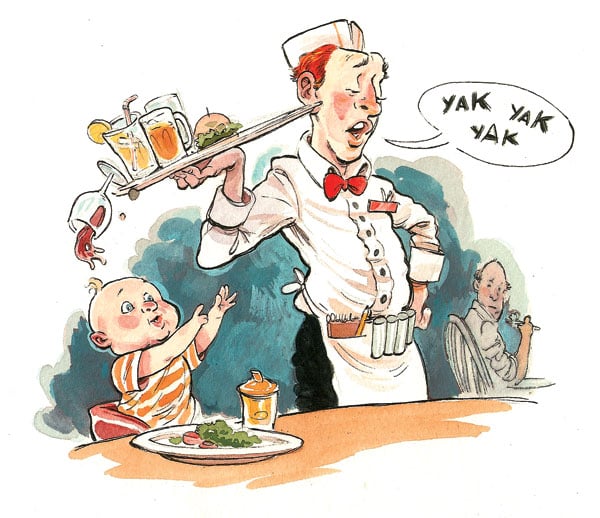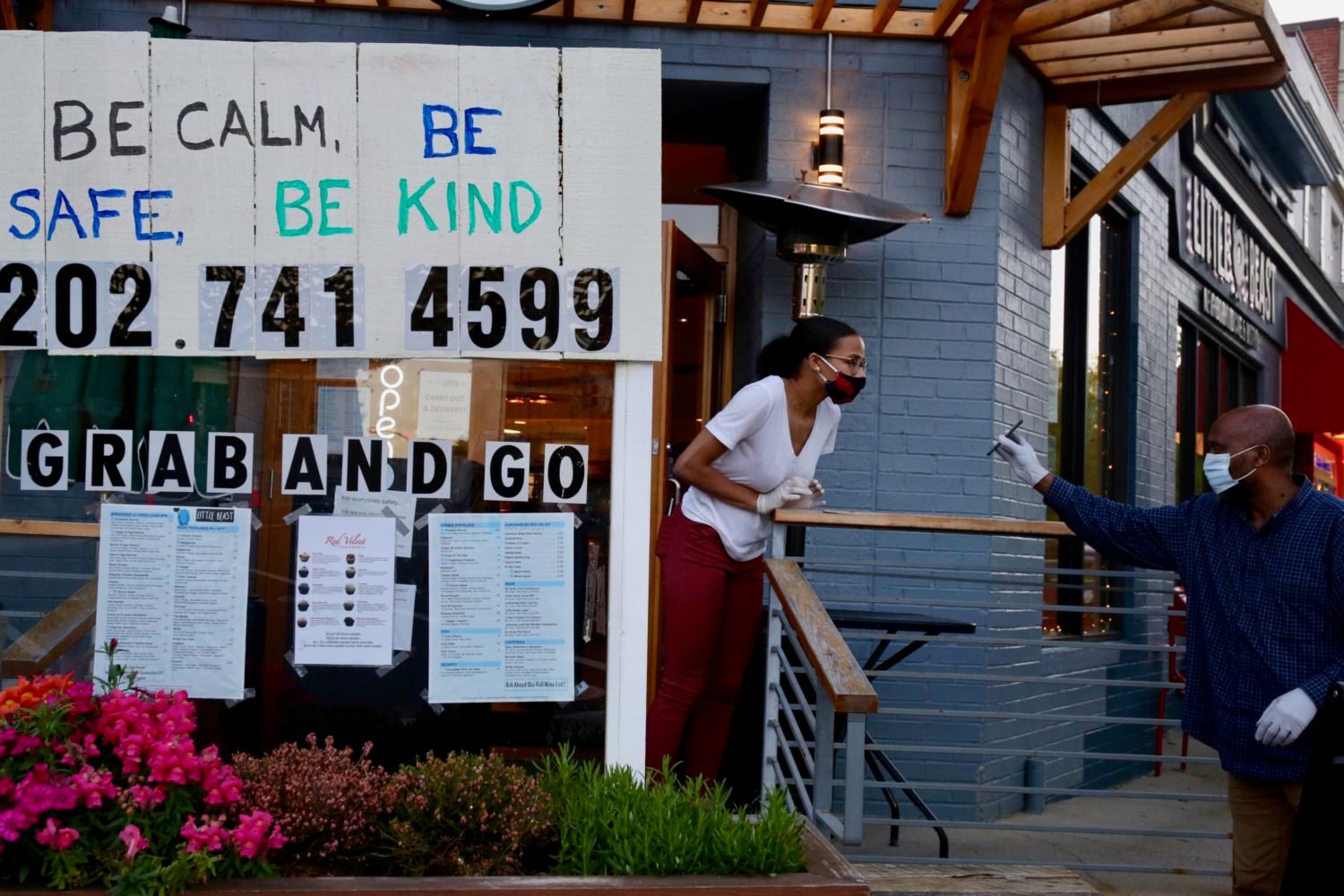
Around the time Jesse turned two, my wife made a decision.
Her decisions are never the result of minor epiphanies. They never involve switching cell-phone providers or choosing a new doctor. When she says, “I’ve made a decision,” I brace myself.
“It’s too hard taking us along,” she said. “And I don’t enjoy it if he doesn’t enjoy it, and who can tell if he’s going to? There are just so many things that can happen.”
The precipitating event had occurred a few nights earlier at a restaurant in DC’s Palisades I was reevaluating. She was feeding Jesse a hunk of bread and butter, and he began to choke and then cry. Every head turned. My wife quieted him after several moments, enabling us to hear all the disparaging things everyone around us was saying–condemnations of our parenting style, of our effrontery in taking him out to eat at a place like this. (Never mind that the restaurant had a high chair!) We spent the late-summer night taking turns with him out on the sidewalk, one of us holding down the table, the other walking him back and forth on the pavement, all three of us bitten by mosquitoes. At least somebody ate.
“You’ve got a job to do, and you’re trying to make everybody happy and making nobody happy,” my wife said. “So just forget it.”
“What about one of the noisy places?” I suggested.
I’d come to love the noisy places, those casual midlevel restaurants with exposed ceilings and cement floors that had been popping up in DC. Young people loved them, finding in their cool industrial aesthetic a validation of their decision to live in the expensive but bustling big city; older people hated them, despairing of ever having a normal conversation. As a food critic, I saw the merits of both arguments. But as a new parent, I was a fierce partisan. I loved the protective cover they offered. My son could screech like an electrocuted cat, as he did one night at a clattering bistro, and no one would glance up from the scallop crudo. If only every new restaurant that opened had decibel levels akin to that of a construction site, I sometimes thought.
It took all of half a meal for me to realize that being a daddy and being a food critic were incompatible, like pairing foie gras with ice cream.
“No,” my wife said, “not even the noisy places.”
The only exception she’d make was for a Latin or Asian restaurant.
“How about we revisit this again in a few months?” I said.
She didn’t agree; she didn’t disagree.
“Look, we’re learning,” she said. “He’s going through phases, but we’re going through them, too. This isn’t forever. And that doesn’t mean you can’t go out with him, just the two of you. It’ll be good for you to have that time together. Daddy-and-Jesse time.”
Things were harder without my wife there–like being-denied-the-use-of-my-limbs harder.
I hadn’t realized just how smooth and skilled she was until I was forced to handle it all myself. How did she do it? How did she attend to all his needs–cutting his food into small bites, reading him a story, swabbing him down whenever his face became one big schmutz–while also serving as a sounding board for my impressions and ideas?
It took all of half a meal for me to realize that being a daddy and being a food critic were incompatible, like pairing foie gras with ice cream.
I couldn’t make mental notes about the red wine that was served too warm, the sauce that hadn’t been properly reduced, the waitress who neglected to fill the water glasses . . . and also read him a story, color with him, and cut his food into 47 pieces.
Restaurant visit number 466: I ducked into the bathroom to make notes. I figured the sanctuary of the stall would reduce the static in my head.
I began pecking out letters on my iPhone: “Scallops = slight translucence in center, dark crusting on top. Micro-greens, dabs of corn sauce. Gazpacho blended smooth, a thickness there–bread or bread crumbs?” But I still had my son with me.
“Daddy, whatcha doin’?”
“Making notes,” I said.
I heard someone enter the bathroom. “Making notes,” Jesse sing-songed as the door to the next stall slammed shut.
“Daddy’s making notes.”
My son the mole.
My stall-mate could have been a manager, a waiter. I imagined walking back to my table to the stares of the staff as the news made the rounds: critic in the house.
Among the first laws of being a food critic is not to take things personally. Our recourse is our column. A bad night is writing material.
But my dinners out with Jesse several nights a week were an exercise in double consciousness. I was both the discerning critic and the anxious father. The critic in me focused on the server’s knowledge of the menu and of food generally, his ability to keep the flow of the meal smooth and steady. The father in me was fixated on the waiter’s regard for the little person at the table. Servers were either with you, I was learning, or they were against you. There was rarely an in-between.
One night a waiter set down a giant steak knife in front of my son. Servers routinely gave him stemware. A few brought him apple juice or milk in a wine goblet. I’ll never forget restaurant visit number 684 and the cast-iron skillet of mushrooms and polenta. “Hot–careful,” the waiter warned. He walked away, leaving the scalding handle much too near my son’s face.
Jesse’s little fingers drifted toward it. I grabbed his forearm and squeezed hard. He began to cry at the pain I’d caused–a pain to forestall a nastier, more lasting one.
Hoping to avert disaster, I created it: I knocked over a glass, spilling water all over. The waiter materialized with napkins and stood watching as I blotted while the spill, moving as inexorably as floodwaters, dripped onto Jesse’s lap.
The manager swung by, and the men stood watching. Doing nothing. Like men do.
The male staff at restaurants were, almost without exception, awful. That’s not to say all the waitresses were superior at their jobs, just that the women were more inclined to understand that having a toddler at the table meant taking care of things other than drink requests and asking if everything was seasoned properly. More inclined to improvise entertainments to distract Jesse–spoons and straws to play with, pen and paper to for drawing, even a cookie fetched from the petit four plate.
Some people prefer a female doctor–believing, rightly or wrongly, that a woman will be more sensitive to their needs. I had never understood that position until now. I didn’t ask to be taken care of by a waitress and not a waiter when my son was with me, but the father in me pleaded silently to be given a waitress.
It was hard with him. It was hard without him. The nights that neither he nor she came with me felt strange, as if I had one life and they had another. I sometimes felt like a traveling salesman.
Next: We never did visit that “kid-friendly” place.

















